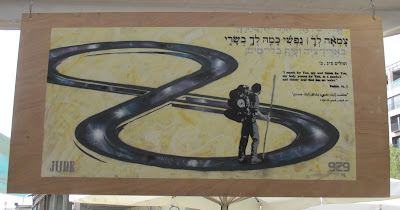In the front pages of the synagogue's prayer book are the words of a recently retired rabbi:
"Praying is like playing jazz. The more you pray, the richer your prayer becomes. You can pray alone, but the exciting things happen with fellow pray-ers. It helps to know and trust the others, too (although you learn a lot when you pray with new people). Some services are traditional, others creative. Some synagogues are formal, others less so. The Jewish service is built around a set of spiritual themes. Sometimes we all pray in harmony, other times we each pray at our own rhythm, at our own volume.
"The siddur is a framework, like the page of notes in front of the jazz player. If you choose to use these words, know that if you read the prayers, you are not praying. One should try and reach a proper balance between the pray-er and the prayer, and between the pray-er and other pray-ers."Tonight, in the back row, I'm thinking of the many "players" I know: Carolyn Wilkins in Cambridge and Lori Rivera and Art Alm and Brad Hecht and Dayan Kai in Hawaii and Steve Uccello and Stan Poplin and Zack Olsen and Renata Bratt. I'm reminded of the "exciting things" that happen when we pray (and play) together. The temple we create, in time.
I'm also aware, especially here, in this city, of the prophetic dimension: how peacemaking, too, is like jazz; how social change requires improvisation and discipline at the same time. I'm aware that agitating for justice (Black Lives Matter, ecojustice, all of it) is most effective, most transformative when we play together and pray together and find the balance between one and all. "Sometimes we all pray in harmony, other times we each pray at our own rhythm, at our own volume."
With this sweet community of Jews, we welcome Shabbat and give thanks for the Beloved's companionship and presence. And we step gently, back to the street, back to the broken world, to love it and tend it and heal it as we can.

